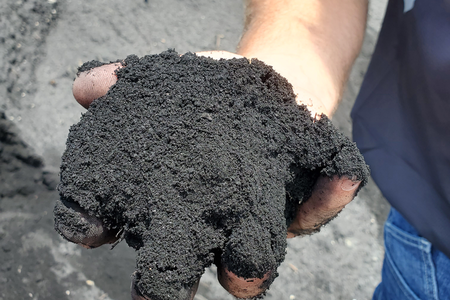Published: September 6, 2020, 11:46am | Modified: September 6, 2020, 11:46am
If you don't know what Biochar is? Or aren't sure about "How It Can Benefit your Garden, Then stick around as I will discuss organic ways to use Biochar in your garden and the benefit of using Biochar for your garden.
I think the Biochar is fantastic. And in most all cases, It will make your plants grow better and improve your garden soil. But it's very misunderstood and often unknown by many gardeners. Let's begin by discussing precisely what Biochar is.
What is Biochar?
It's a type of black carbon, which is where some confusion arises because there are many other types of black carbon. Charcoal is probably the one that we're most familiar with, so many people think charcoal is the same as Biochar. And scientifically speaking, there's a lot of similarities. Still, for gardening purposes, Biochar is a specific type of black carbon explicitly used to sequester carbon and improve soil. The specific attributes that make it different, are what makes Biochar perfect for the garden.
How to make Biochar:
Biochar is made with a process called pyrolysis (pyrolysis: decomposition brought about by high temperatures in the absents of oxygen) . And during that pyrolysis processing, almost all of the volatile gases and moisture are removed from whatever materials are being used as the biomass pieces (this could be anything from wood mulch, green vegetation waste, untreated lumber or a myriad of other materials ). That can't be said for the charcoal. There's still a lot of moisture, and there's a lot of volatile gases. When the explosive gases escape the Biochar during pyrolysis, what is left behind is essentially a pure carbon framework. Here's a demonstration of that basic concept.
Imagine that the charcoal is like a golf ball. There's a lot of surface area in the dimples. But inside, it's not empty. There's still moisture content, and there's still all those volatile gases and oils. Now, imagine that the Biochar is the same size, but it's a Wiffle ball. There's a lot of free space on the inside and many big holes on the outside. Now let's imagine that a Wiffle ball is put inside another Wiffle ball, and a Wiffle ball is put inside another Wiffle ball. And we continue this process until that little piece of Biochar has millions and millions of these holes that lead to other holes. It's not hollow. It's a structure filled with open-air spaces. And it's this structure that is the primary reason I think Biochar is so unique in the garden because each of these little holes can become a repository for beneficial soil bacteria and moisture and nutrients. All of these little pieces of Biochar are giving back to the soil excellent benefits. You don't get that with the use of charcoal. Charcoal can benefit the soil structure in some ways. But it doesn't have the fantastic benefits of Biochar. The term Biochar was first used in the scientific literature in 1988, but it wasn't until 2009 that it started becoming known, and gardeners began using it. It's important to note, not all Biochar is equal, because any biomass can be turned into Biochar using pyrolysis. That initial ingredient, the biomass type, can be different, which will give other attributes to the finished Biochar.
Benefits of making BioChar:
According to eminent agronomists and scientists, BioChar has opened the door to the potential for sustainable agricultural development and horticulture management. It creates a favorable living environment for beneficial bacteria and mycorrhizal fungi, which maintains the soil's organic quality, and increases soil fertility. Biochar is capable of working in the soil for hundreds or even thousands of years all while sequestering atmospheric carbon.
Why is BioChar so valuable?
Climate change is a threat to food security around the world. Biochar has the potential to solve this in a few different ways. First by sequestering carbon and helping to prevent its release into the atmosphere, thus slowing climate change. Second by making farming more efficient thus increasing crop yields. Third by recycling and reducing waste byproducts of farming into usable Biochar. Farmers and gardeners alike will benefit in many ways when they use Biochar for soil improvement, Including:
- Large yields
- Healthy soil
- Low acidity
- Good water retention
- Powerful plants
- Erosion control
- High fertility
- Rich soil life
- Runoff control
Biochar usage:
First, the Biochar should be processed to the smallest size possible, like sugar grains or powder if possible. According to the experience of farmers, using small form Biochar in the soil increases the soil's organic energy, and it can be used in different ways and different doses (more or less). On average around 10% by volume or 4% by weight.
How much Biochar should you use?
From everything we have seen in our use and through others' biochar research, a good "rule of thumb" is 10% of the planting area should be Biochar. If your soil is horrible, you should probably start with a 50/50 mix of Biochar and compost and apply about 1/4 lb per square foot. Awful soil needs a significant injection of organic material along with the Biochar.
Benefits of using Biochar
The plants will grow faster. They'll put flowers on earlier. And that means you'll be able to harvest sooner in Biochar soil, which can be vital for a regions where excessive heat and sandy soils or relatively short growing seasons exist. But there aren't any studies to show that the fruit tastes any different. It's not necessarily better-tasting fruit. It just comes in greater quantity and from a healthier plant.
Biochar is best for poor soil or a soil that is moderate in nutrients and soil life. When you get to an excellent, lush, rich soil, Biochar doesn't offer that many benefits. Still, if you're trying to create good soil in your garden, Biochar is ideal because of its bacteria, moisture and the nutrients retention abilities. But there's an essential factor to be aware of when you source Biochar. When you get your Biochar, it's probably going to be very dry and raw. And that's where its customization capabilities come onto play. The ability to inoculate or charge your Biochar with a the exact variety of nutrients that suit your unique situation
If you put raw or non-inoculated Biochar into your soil, you may be waiting a while before you see major improvements to your soil. To make raw Biochar ready for your soil you will need to inoculate it. That's also been called charging it or energizing it. It would be best if you inoculated the Biochar with microbes, all those beneficial organisms that are so great for our soil. All of these microbes need moisture to not only survive but also thrive. And so this is the most critical step, is to add the moisture to the mix. Now, there's an important thing to consider. You can add regular water, which's OK because there should be enough of the microbes within the ingredients to populate the Biochar. Still, if you can use worm and/or compost tea, you're introducing all of the bacteria and microbes in those worm castings or compost. If you have a fish aquarium and you need to clean it out, well, take that water from your aquarium and put it in here because there are outstanding amounts of bacteria in aquarium water. Whatever it is, you need to drench this mix completely. You can add molasses or syrup or some sugar-based liquid at this point, and that will boost the bacterial population growth.
So with it all mixed, cover and store in a shady area for several days or longer to allow the organisms to colonize the Biochar. There are several ways to incorporate Biochar into your soil. My preferred method is to integrate that Biochar as you're creating your bed, as you're adding soil. Otherwise if that's not possible you can top-dress the area and water in thoroughly.
Many uses of Biochar
Indoor plants? Adding Biochar to potted plants will increase soil growth and give you healthier plants. Although it can be invaluable for farmers and gardener, it has many other practical uses. The absorption properties of Biochar make it a suitable solution for odor control. Useful for removing unwanted odors: in cars, homes, compost piles, pet odors, toilets, bathrooms, and even in smelly old sneakers! Just fill an empty tea bag or cheese cloth with your raw Biochar and place wherever necessary. Strong moisture absorption capability makes it extremely helpful in cutting down germs in damp areas.
Find ways to enrich your life with Biochar and help create a market to encourage mass production of the fantastic natural product. It can help save the world!

